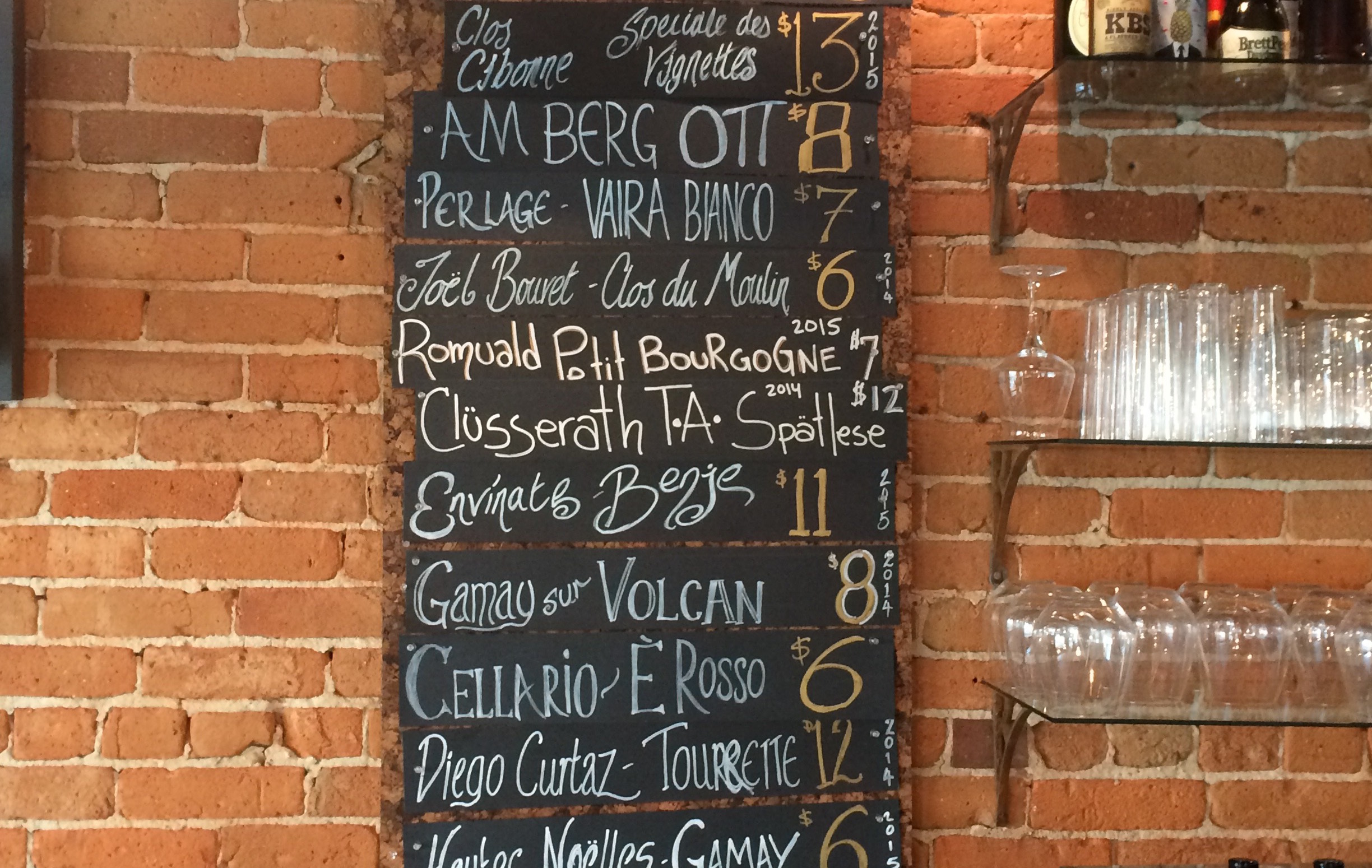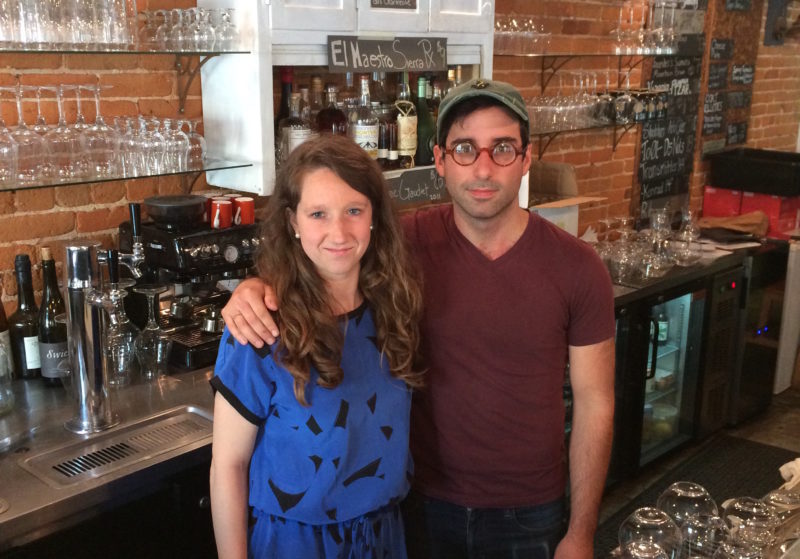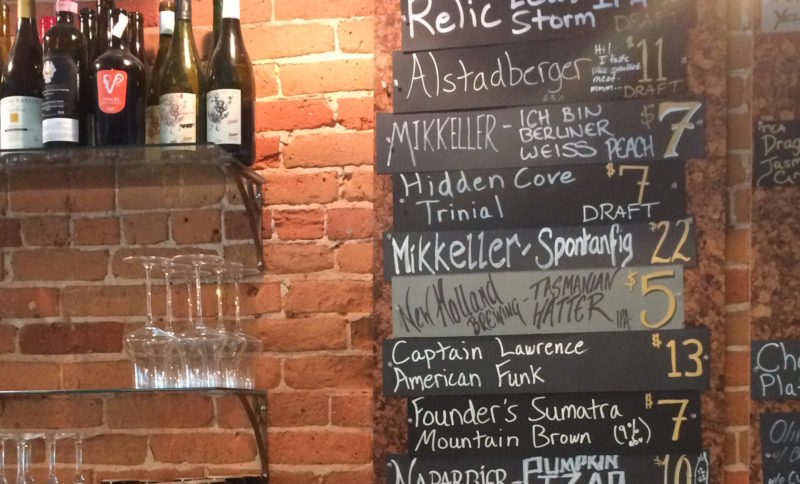


After noticing a vacant niche in Providence’s bar and restaurant scene, three friends got together and worked hard to create their shared dream: Fortnight, a new establishment which soft opened downtown in December 2016 and officially launched in January. Although known primarily as a wine bar specializing in natural, biodynamic varietals, Fortnight also boasts an exceptional beer list, an array of spirits, and delicious small plates.
Fortnight is also carving out new turf as one of the first, if not the first worker-owned co-ops in the beverage service industry nationwide. Sustainability, thoughtfulness, and a passion for fine beverage and food are reasons why Fortnight has already attracted a devoted regular clientele, but there are many other attributes that make this airy, welcoming spot unique.
Longtime friends Elizabeth McDonnell and Chris Norris-LeBlanc both had day jobs, and Mike da Cruz had graduated law school but didn’t want to become a lawyer. The three, who met through Brown University, had been getting together for years to cook and drink, and the topic of opening a bar someday came up in conversation regularly. Although dreams are common, having the will, plan, and resources to actually implement them is less so.
“We’re not getting any younger, so we’ll either do it now or we might as well not bother,” says Liz. “Our lives weren’t getting less complicated as we moved forward.”

Because Providence is known for having so many exceptional restaurants, the trio knew from the start that they wanted to open a bar instead. It took six to eight months of searching before the old Aruba Steve’s building downtown became available; previously, they envisioned opening up on the West Side.
“Downtown was a different thing than we had originally conceived,” says Chris. “We were going to be on the West End and be super chill and open a little later only four nights a week. Opening downtown thrust us into a position where we had to be much more serious.”
The three first-time bar owners spent many long night tiling floors, building tables, and installing the bar top themselves in order to get the space ready to open. Liz, a graduate student, had no prior experience working in the food or beverage industry. Mike had only worked selling wine in Brooklyn for a couple of years post-college. Chris, a teacher by trade, grew up working for his family’s restaurants and catering services, then occasionally running a small pop-up restaurant out of his house as an undergraduate, and then at local restaurant Julian’s for a few months post-college. He is also a home brewer and does a lot of beer traveling and tourism.
Despite their limited industry experience, the team made it work through their shared passion for great food and drink. Even with a lack of advertising, word of mouth spread like wildfire in the community about the wine bar and its practices. While I was there early in their evening shift, Fortnight’s bar stools filled up.
The bar brings in guest bartenders weekly, usually vintners and importers, which helps to mix things up and to get the word out about different and exciting wines. Patrons enjoy chatting with the special guests, and the place is usually packed.
Aside from their shared passion for great food and drink, the roots of Fortnight’s operating approach can be found through the three’s participation in social justice organizing and advocacy work through Brown, attending many protests.
“We’ve all sat in the public safety complex,” Liz jokes. “It started to feel disempowering to the kind of organizing was doing… there’s all this in-fighting among leftists. So, we built a place that could be run the way we wanted to be run.”
Chris echoes her sentiment: “I had thought for a long time that the idea of a workers’ cooperative, a worker-owned business is the kind of thing I want to be involved in—hopefully someday primarily. [The three of us] all share a belief that that’s the right way to organize.” A potential fourth candidate is also currently being introduced to the co-op, and more might join in the future.
Initially, having three partners was valuable to the owners.
“There’s always a tie-breaker,” Liz says, although she also notes that there have been no truly major disagreements between her, Chris, and Mike.
She wasn’t sold on the name Fortnight two years ago, but “it stuck.” The word fortnight evokes a feeling of seasonality and harvest, according to Chris, which is especially relevant given that the bar offers a constantly-rotating menu of small plates, which changes so often that there is no written menu at all. All three enjoy cooking and bring in different dishes, so having an endlessly-innovative menu keeps them interested and engaged. Fortnight also has a zero-waste policy, which reduces overhead to keep prices down and is accomplished by making food that “gets better over a couple of days”, like goat rillette and Tuscan pomodoro soup.
“Because it’s not a restaurant we don’t have to make a ton,” says Liz. “we make enough for a few days and then rotate. The only food wasted is what someone leaves on their plate, but then I take that home to my chickens.”
Aside from the sustainability and financial benefits, the rotating menu serves another purpose: it encourages communication between patrons and bartenders.
“It was a much-beleaguered but intentional decision to do our menus this way, but the result has been that you have to talk to your bartender and have a conversation,” says Chris. “So, if you come in every two weeks and the menus are totally different, you’re always engaged in that process. I think it’s worked out really nicely and brought a lot of really thoughtful people into the bar.”

Beer is also carefully curated—mostly sours from places like Belgium but also areas one wouldn’t normally expect, like Austria and Norway.
Chris notes that, “Sour beer is a big thing in most major U.S. Cities, with bars that are very specialized and take that on, but it didn’t seem like anyone had picked up that gauntlet here, so it’s something I’m trying to do. It’s cool to be able to put so much time and energy into something like a cellar list.”
He’s excited about the bottle program the bar is working to roll out: a couple hundred wines and maybe 60 or 70 beers. In addition to the bottle list, new developments in the works include outdoor tables, a new sign, and hosting more sit-down ticketed dinners.
When asked if she has any advice for someone wanting to open up their own bar, Liz responded, “My advice is to just do it. The timing couldn’t have been worse, and we didn’t have any money; we didn’t want bank loans, so we did grassroots fundraising of very small loans from our friends, between $500 and $5,000. That way even if we failed, we weren’t hurt by having a really big loan, and no individual was hurt by contributing a small amount. We do sell spirits, but we don’t do cocktails because we want to keep overhead low and there are already great cocktail bars in Providence. We built everything by hand, but we just figure out how to do it and we do it.”
For more articles that explore the culture behind the industry, sign up for your own BevSpot community account to get notifications on the latest posts as well as gain access to exclusive tools and guides.
